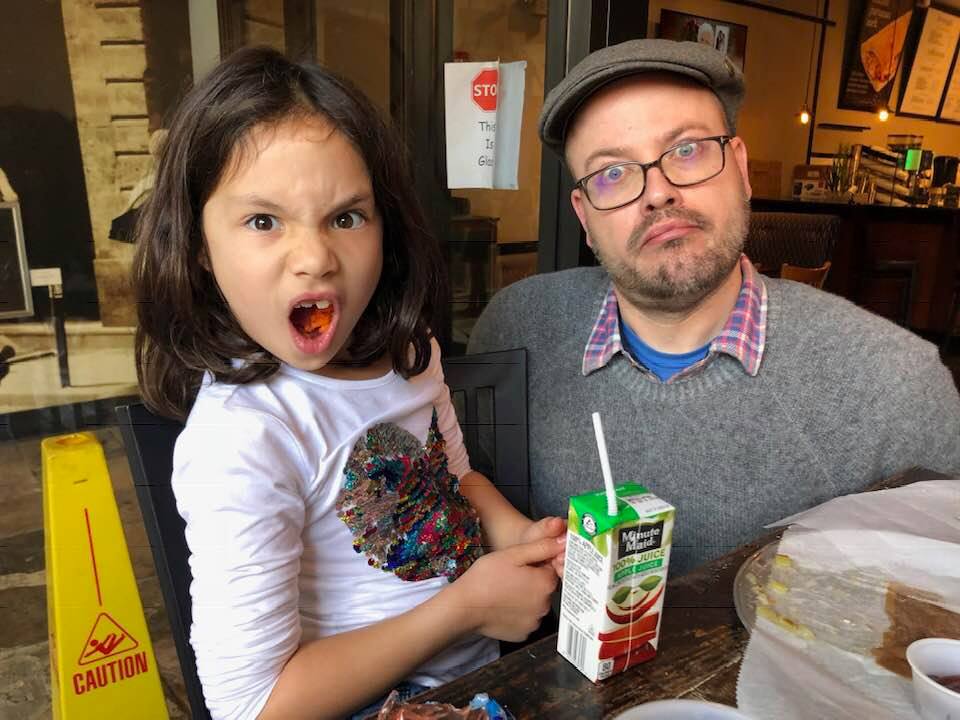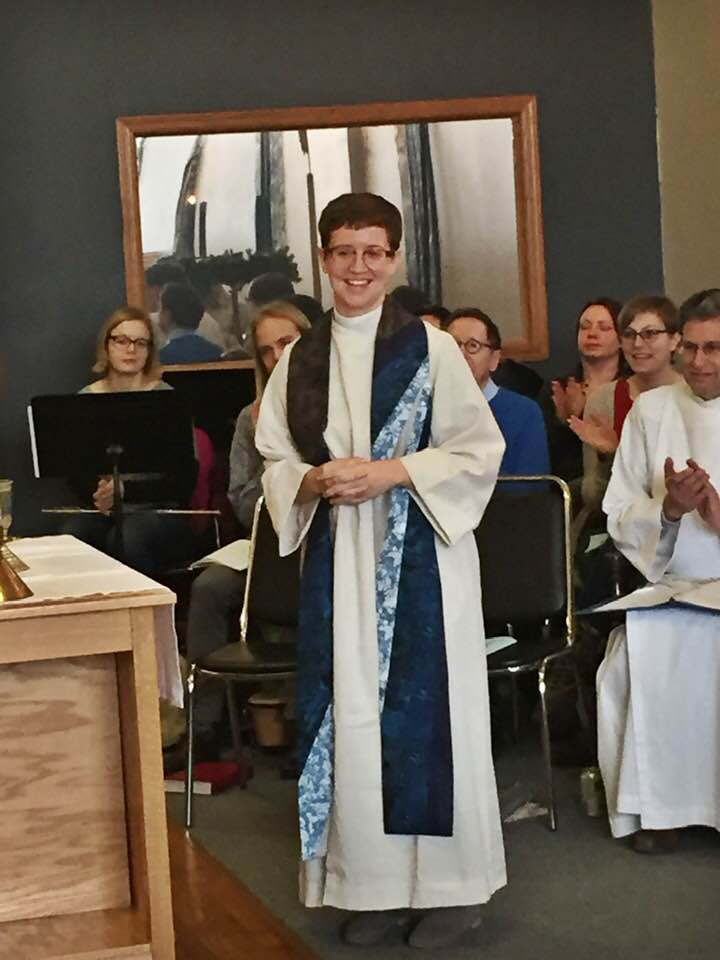The following sermon was preached in Augustana Chapel at the Lutheran School of Theology at Chicago (LSTC) on the occasion of the ordination of the Rev. Erin Coleman Branchaud to the ministry of Word and Sacrament in the Evangelical Lutheran Church in America (ELCA). I served as Pastor Erin’s internship supervisor at St. Luke’s Lutheran Church of Logan Square for the 2016/’17 academic year, where she now serves as the called and installed pastor.
Texts: Ezekiel 2:8-3:4 + Psalm 113 + 1 Corinthians 11:17-26 + Luke 1:39-55

A couple of weeks before Thanksgiving our god-daughter, Kai, and her moms flew in from New York to visit Kerry and I here in Chicago. Since her internal clock was still set to East Coast time, Kai would wake up extra early each morning and sneak into our bedroom to ask me if I was ready to come up and read with her. I’d mumble yes, and then turn back over in bed. If I was lucky, this bought me another ten minutes before she’d return. “Ninong (the Tagalog word for godfather), you said you’d come read with me!”
 Children’s literature has gotten edgier since I was Kai’s age, I think. I remember books like “The Berenstain Bears and the Spooky Old Tree” and the Clifford the Big Red Dog books. By contrast, Kai kept handing me books like “I Dissent,” an illustrated biography of Supreme Court Justice Ruth Bader Ginsburg, and “She Persisted: 13 American Women Who Changed the World.” Each of these unabashedly political and progressive books had catch phrases that Kai relished saying over and over as we turned the pages. “I dissent!” and “She persisted!” have never sounded quite so sweet as when a girl of nearly seven is curled up in your lap shouting them with the kind of exuberance generally saved for ice cream and puppies.
Children’s literature has gotten edgier since I was Kai’s age, I think. I remember books like “The Berenstain Bears and the Spooky Old Tree” and the Clifford the Big Red Dog books. By contrast, Kai kept handing me books like “I Dissent,” an illustrated biography of Supreme Court Justice Ruth Bader Ginsburg, and “She Persisted: 13 American Women Who Changed the World.” Each of these unabashedly political and progressive books had catch phrases that Kai relished saying over and over as we turned the pages. “I dissent!” and “She persisted!” have never sounded quite so sweet as when a girl of nearly seven is curled up in your lap shouting them with the kind of exuberance generally saved for ice cream and puppies.
It isn’t hard to guess the motives directing the selection of books Kai is consuming at this impressionable young age. As a mixed heritage, Filipina girl with two moms, Kai is going to encounter some heart-breaking ugliness in this world. It’s not a matter of if, but when, as a recent text message exchange with one of her moms foreshadowed.
“This morning your god-daughter asked ‘Who has it harder, women or Black people?” the first text read. Then the second, “I asked her what she thinks the answer is. She said, ‘just tell me, mama!’” I replied, “Did you say, ‘Black Women?’” (it’s never too early to teach them about intersectionality). The reply came back, “Of course!”
“Who has it harder?” is one of the questions floating in the background of nearly all the texts that Erin has selected for us to chew on this morning. When the psalmist imagines the LORD bending down to raise the weak from the dust and the poor from the mire, they are using poetry to describe structural oppression. When Paul chastises the community in Corinth for the ways that their worship simply repeats the patterns of humiliation that poorer members were already experiencing elsewhere in their lives, he is indicting not only their failure as a church, but the arrangement of power in the ancient world.
There is no more beautiful text, however, that at once holds together the pain of the world as it is with undying hope for the world as it will be than this gospel passage from Luke in which we hear Mary’s song, the magnificat. “You have deposed the mighty from their thrones and raised the lowly to high places. You have filled the hungry with good things, while you have sent the rich away empty.”
These ancient, holy words testify to the enduring reality of lament, mourning and anguish that humanity has suffered across all of time, the persistence of inequality and oppression, and yet also ring out with hope for the future rooted in the memory of all that God has done in the past and faith that God will continue to be true to God’s promises in the future.

It is the perfect text for this day, as we gather on the eve of Advent, at the cusp of a new year as the church reckons time, a new beginning, and as we prepare to lay hands on Erin Nicole Coleman Branchaud, to consecrate her for the ministry of word and sacrament as a pastor in Christ’s church. It is perfect because it captures both the challenge and the joy of Christian life for all who are baptized, the challenge of honestly naming who has it harder in a world that consistently confuses privilege with merit, and the joy of proclaiming the liberating power and presence of the God who is always coming into the world to bring new life to people and places left for dead.
Notice that I did not say this text captures both the challenge and joy of Christian life just for clergy, but for all who are baptized. There is a real temptation on days like today to hear the scriptures that have been selected as specifically directed at the person being ordained, when their original intent was to form and feed communities of faithful resistance to empire and the death-dealing powers of the world. The role of clergy within the church is not to carry out that work alone, on behalf of the congregation, but as the Augsburg Confession states, “that we may obtain this faith, the ministry of teaching the gospel and administering the sacraments was instituted. For through the Word and sacraments, as through instruments, the Holy Spirit is given, who works faith; where and when it pleases God, in them that hear the Gospel.”
That is to be your role, Erin, as you carry out your ministry among God’s people as their pastor — to rightly preach the gospel and administer the sacraments. This is no small or simple task. Just listen to how the apostle Paul sets up the words of institution that we are so used to hearing each time we take part in the Lord’s Supper. It’s not enough for Paul to simply pass along to the church what he had first received from those who’d taught him, the story of how Jesus blessed and broke bread and wine with his disciples. No, first he has to tell the truth about what he has seen and heard in the world and in the church. First he has to draw out the practical and public, material and ethical consequences of the Lord’s Supper. First he has to underscore God’s solidarity with all the hungry, suffering people of the earth. Only then does the significance of this meal make any sense. Only then do the words, “for as often as you eat this bread and drink the cup, you proclaim the Lord’s death until he comes” make any sense. To preach the gospel and administer the sacraments requires you to spend your life telling the truth about the reality of sin in this aching world. Only then can we clearly recognize our need for God’s liberating grace.
This is the meaning of this strange image from Ezekiel, who eats the scroll covered with words of woe, of lamentation and mourning, front and back. These are the words God needs spoken to God’s people. Not words of false security or illusory hope, but trustworthy words about the ways that we are all being harmed by this world, and even the ways that we are participating in that harm.
Erin, you have the gifts required for this calling. I know you told me not to talk about you, just to preach the gospel, but I have to say this to you today. You have a gift for telling the truth in ways that set people free. You possess a hard won courage that enables you to speak directly to people about where and how the world is broken in ways that invite commitment and resolve rather than passivity and despair. You are a preacher of the gospel. In your mouth, God’s word is as sweet as honey.
And, if I may also take a moment of personal privilege — which I may, because you asked me to preach today — you are, as you know, being called to pastor a community that neither needs nor expects you to do this work alone. In the community of St. Luke’s you have found people who want to sing God’s song with you, who are eager to be part of God’s powerful, transformative, world-changing mission. Like Mary, they believed in what God could accomplish through them when such faith seemed foolish. Not only will they appreciate your gifts, they will be patient with your weaknesses. You can trust them with all that is messy and unresolved in your heart. I should know.
That’s why, the moment the news reached my ears that you and St. Luke’s had chosen each other, my heart leaped for joy! You are going to be a blessing to one another, and in your ministry together you will bless the world.
Amen.